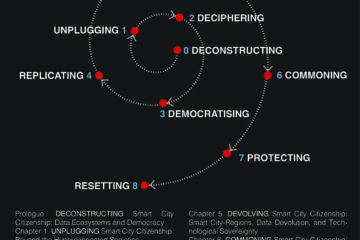Washington and Pyongyang: Back to Square One?
US administrations may change, but the North Korean problem, in all its guises, has plagued the United States for at least the past thirty years. The new Commander-in-Chief, Joe Biden, and his administration are facing increasing calls from the broader international community to clarify US policy towards East Asia, which includes China, Japan, and the two Koreas. The last Democratic administration, that of Barack Obama, focused on strengthening US bilateral alliances within the East Asian region, regional stability, and bolstering relationships with emerging powers. Yet, it did not fully address one of the greatest geopolitical challenges in the region: North Korea’s nuclear program. During the Obama administration, North Korea conducted four nuclear tests, one of which it claimed to be …
Impacts of the COVID-19 Pandemic on the Water-Energy-Food Nexus
In a recently published journal article, we argue that there is a pressing need for a systemisation of the impacts of COVID-19 on water, energy and food security. We also explore the tangible impacts of the pandemic, including negative aspects, like increase in medical waste, and positive aspects, like some improvements in air quality and carbon emissions. The COVID-19 pandemic offers an opportunity to examine the impacts of system-wide crises on key supply sectors, such as water, energy, and food. These sectors are becoming increasingly interlinked in environmental policy-making and with regard to achieving supply security. Now, there is a pressing need for a systematization of impacts and responses beyond the disruptions on individual supply sectors. Specifically, this paper provides …

Smart City Citizenship: A Techno-Political Review (of Cities and Nations)
COVID-19 has hit European citizens dramatically, not only creating a general risk-driven environment with a wide array of economic vulnerabilities but also exposing them to pervasive digital risks, such as biosurveillance, misinformation, and e-democracy algorithmic threats. Over the course of the pandemic, a debate has emerged about the appropriate techno-political response when governments use disease surveillance technologies to tackle the spread of COVID-19. Citizens have pointed out the dichotomy between state-Leviathan cybercontrol and civil liberties. Moreover, the giant technological flagship firms of surveillance capitalism, such as Google, Amazon, and Facebook, have already assumed many functions previously associated with the nation-state, from cartography to the disease surveillance of citizens. But particularly, amidst the AI-driven algorithmic disruption and surveillance capitalism, Smart City Citizenship sheds light on the way citizens …
Biden, López Obrador and the politics of migration: a return to the status quo?
Joe Biden’s presidential victory has brought temporary relief for many undocumented and mixed-status families in the US. Biden promised to reverse several of Trump’s executive orders on immigration and refugee policy within his first 100 days in office including reinstating the Deferred Action for Childhood Arrivals (DACA) program, ending the Migrant Protection Protocols (MPP) also known as “Remain in Mexico,” and creating a “road map” to citizenship for the approximate 10.5 million undocumented immigrants in the US. While Biden’s immigration agenda contains federal and local level priorities, little emphasis has yet been placed on the bilateral scale with the US’s southern neighbour, Mexico. Yet, bilateral immigration negotiations should be a priority for administrations on both sides of the border. In …
OxPol BlogCast Episode 2: The Milk Tea Alliance
Welcome to the OxPol Blogcast, a podcast where we will be sharing research, analysis, and experiences from members of the University of Oxford’s Department of Politics and International Relations. On each episode, we will talk to a guest about a piece they’ve written for the OxPol Blog. Then, we’ll discuss their larger research agenda, their insights on conducting political science, and their time at Oxford. On the 2nd episode of the OxPol BlogCast, host Chase Harrison talks to MPhil students Jasmine Chia and Scott Singer about the Milk Tea Alliance and its relationship to 20th century black anti-colonialists. They also discuss the movement to decenter International Relations scholarship. Read the original blog post here: https://blog.politics.ox.ac.uk/the-new-worldmakers-how-the-20th-century-black-anticolonial-dialogue-reveals-the-strategic-importance-of-the-milk-tea-alliance/
Italy’s Other Wave: Protests during the Second Lockdown
Italy was the first Western democracy to impose a country-wide lockdown in response to the COVID-19 pandemic. Despite successfully curbing the number of infections in the first half of 2020, Italy saw its cases increase again in October, prompting Prime Minister Giuseppe Conte and local governments to announce new restrictions to curb the cresting second wave. Despite the clear memory of the significant death toll and warnings of the dangerous winter to come, however, these announcements have been met with opposition. On the evening of the 23rd October, thousands gathered in the streets of Naples to protest against the forced closure of shops and restaurants and the threat of a local lockdown. A group of about 300 people—including youth, extremist political groups, and football hooligans—escalated into a violent protest, attacking police officers, burning cars, and vandalizing private …
The New ‘Worldmakers’: How the 20th Century Black Anticolonial Dialogue Reveals the Strategic Importance of the Milk Tea Alliance
Growing tension in Berlin. A proxy war in Korea. The escalating Space Race. The world—and particularly its realists—focused on the evolving great power competition between the United States and Soviet Union during the Cold War. However, in the shadows of this marquee battle, black leaders such as Kwame Nkumrah, Eric Williams, and George Padmore drove an anticolonial dialogue that sought to transform the international order on their own accord. Their core mission: to reframe sovereignty, reconceptualising it as self-determination and the elimination of racial hierarchy. This weighty conversation, which took place from the 1950s to the 1980s, doesn’t seem related to an Asian meme war in 2020. However, amidst a new, growing Cold War between the U.S. and China, the ‘Milk Tea Alliance’ has emerged as the newest supranational …

The Global Inequity of Emissions Consumption: Carbon Accounting as the Future Stepping-Stone in International Climate Negotiations
As the host of the postponed COP26 climate summit, the UK has set out the ambitious goal to convince all countries to commit to reach net zero emissions as soon as possible within their mandatory climate targets. Reducing overall emissions remains the paramount task of global climate governance. However, an overlooked but defining question concerns carbon accounting—the methodology of how national CO2 emissions are assessed. The conventional territory-related production approach, which has traditionally been used in climate governance, stands in contrast to an often ignored consumption-based approach, which more closely captures emissions embodied in the domestic end-use of energy and goods. This article lays out why the seemingly dull and technical matter of carbon accounting has the potential to become the future stepping-stone for a global consensus on …









